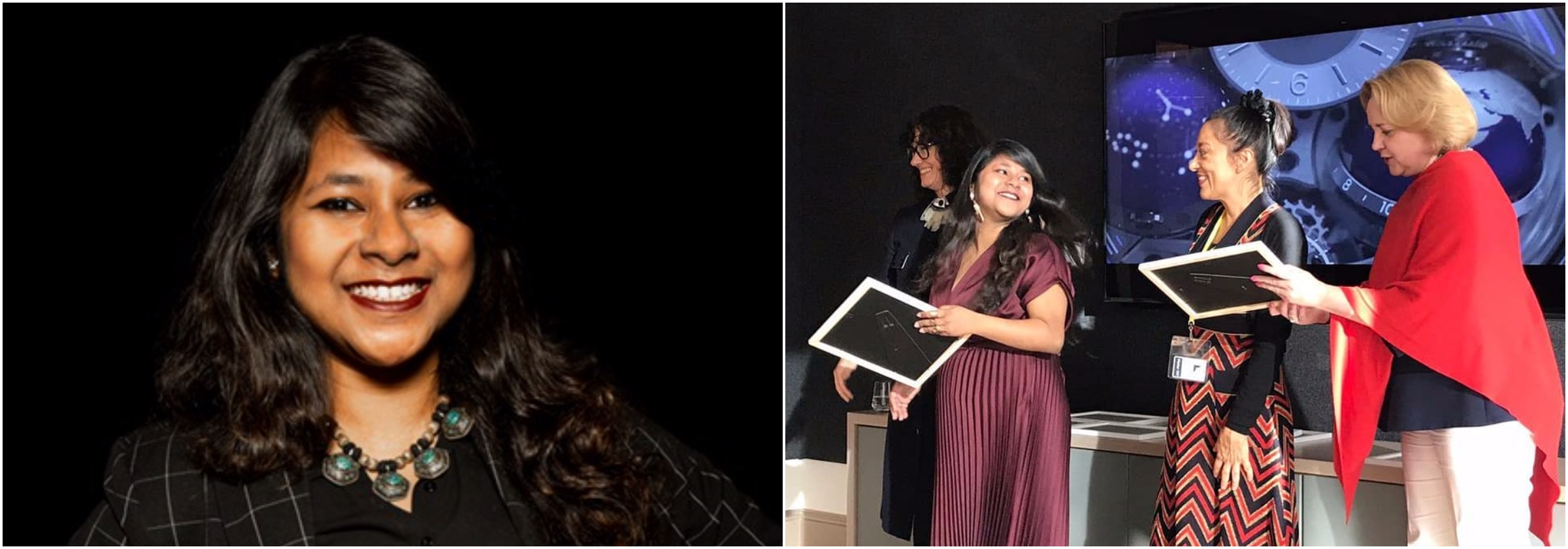MBA student Namami Mondal has received the 2019 Kering Award for Sustainable Fashion. Her project for the future of fashion is a collaboration between Gucci’s deadstock and the traditional hand embroidery of India: Kantha. We caught up with Namami after her busy year as an MBA student working towards the Kering Award and learned more about the inspiration behind her project, the future of sustainable fashion and her experience as a student at LCF.

What does sustainable fashion mean to you?
Sustainable fashion, as a concept, has multiple elements to it. Sustainable fashion is not just ensuring that the clothes we choose to wear are eco-friendly, leading to reduced waste on disposal or helping to complete the circular economy model of recycle and reuse. It is also ensuring that the stakeholders of the production process of those very fashion or beauty products, are not exploited. That every weaver, craftsperson, dyer etc. are duly paid for their engagement with the product, that there is no child labour involved. Women, whether tailors, embroiderers or finishing ladies, need to feel empowered from the grass root levels.
Sustainable fashion according to me, would be the successful adoption and implementation of values of sustainability at all levels of ideation, production and consumption of a fashion product, which benefits both the environment and the maker.
How did your idea for your project develop?
The main concept was generated from a few observations and causes dear to me: the Kantha, one of the oldest forms of traditional hand embroidery techniques practised by rural housewives in craft clusters; deadstock; and India as one of the most promising markets for fashion retailers.
My project aims to deconstruct panels from Gucci’s deadstock apparel and repurpose them into beautiful Kantha hand embroidered swatches of fabric to be used for Gucci eyewear boxes, eyewear cases, handbag linings etc.
A partnership with Gucci will enable and empower these female artisans to develop and expand their embroidery techniques to become an internationally recognised product and preserve the precious traditional Indian craft that is Kantha.

How do you see the industry developing in the future?
The fashion industry today is aware of the merits of being sustainably conscious as a brand and adopting a business model that highlights their sustainable measures in order to attract a loyal consumer base. Brands are now focusing on converting this awareness into measurable actions so that they can genuinely bring about a positive impact.
This Kering Awards is proof that international luxury conglomerates want to engage with students in order to come up with innovative and disruptive solutions to tackle the challenges regarding sustainability in our industry today.
What defines luxury for you?
Luxury is an aura around a product or service, which is laced with desire prolonged over time. Luxury could be the glamour of a couture design, the heritage value of traditional craft or textile manipulation techniques used or any other unique selling proposition of a product or service which excites and evokes desire in the consumer. Sometimes the scarcity and uniqueness of the product, along with the high price point becomes sources of luxurious appeal for the consumer.
You are studying on the MBA at LCF - please tell us about your time on the course and how this shaped your project.
The MBA from London College of Fashion has provided me with an excellent platform to test my skills and knowledge at an international level. It has taught me how to evolve into a true fashion business leader from being just a designer. The academic and industry-focused experiences gained from the LCF MBA have been truly fantastic.
What role did the MBA play in the Kering Sustainability Awards?
Studying the LCF MBA gave me the opportunity to participate in the Kering Sustainability Awards 2019. My business solution to Gucci’s Circular Economy brief was shortlisted to top ten ideas from across the university, during a period of almost six months of rigorous industry training and intensive business plan development.

As I learned more about the international fashion industry in my classroom; on how to analyse a brand’s merchandise mix; the different functions of the supply chain; the operations aspect and more, I realised that UAL upholds sustainability as its core value, underlining all teachings and concepts.
I feel lucky to be a part of such a reputed institution, to be able to learn from the very best. An MBA from London College of Fashion has definitely provided me with opportunities I had only dreamt of earlier, but now is a reality.
- Find out more about the MBA.
- Explore LCF undergraduate and postgraduate courses.
- What’s on at LCF: open days and events.

